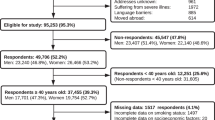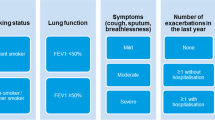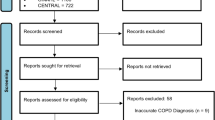Abstract
Background/objectives:
This study examined public support for publicly funded treatment of obesity (weight-loss surgery and medical treatment) and two pulmonary diseases (chronic obstructive pulmonary disease (COPD) and lung cancer) in Denmark. It also investigated whether beliefs about the causes of lifestyle-related diseases (external environment, genetic disposition and lack of willpower) and agreement that ‘people lack responsibility for their life and welfare’ influenced support.
Subjects/methods:
This was a questionnaire study in which a sample of 1003 Danes (age 18–65 years) drawn from an Internet database were surveyed.
Results:
Approximately one in three supported publicly funded weight-loss surgery (30%) and medical treatment of obesity (34.4%). A large majority supported treatment for lung cancer (86.1%), and a clear majority also supported treatment for COPD, whether it was framed as ‘smoker’s lung’ (61.9%) or COPD (71.2%). The belief that lifestyle-related diseases are caused by the external environment or genetic disposition did not systematically influence support. Agreement that ‘people lack responsibility for their life and welfare’ reduced support significantly for all treatment types. However, in contrast with pulmonary diseases, support for publicly funded obesity treatments decreased considerably when beliefs about individual failure (that is that people lack ‘willpower’ and ‘individual responsibility’) were detected.
Conclusions:
Support for publicly funded COPD and lung cancer treatment is considerably higher than that for obesity treatment. This could encourage institutional discrimination through policies that involve charging patients for the treatment of obesity but not for the treatment of other lifestyle-related diseases.
This is a preview of subscription content, access via your institution
Access options
Subscribe to this journal
Receive 12 print issues and online access
$259.00 per year
only $21.58 per issue
Buy this article
- Purchase on Springer Link
- Instant access to full article PDF
Prices may be subject to local taxes which are calculated during checkout

Similar content being viewed by others
References
Beeken RJ, Wardle J . Public beliefs about the causes of obesity and attitudes towards policy initiatives in Great Britain. Public Health Nutr 2013; 16: 2132–2137.
Chambers SA, Traill B . What the UK public believes causes obesity, and what they want to do about it: a cross-sectional study. J Public Health Policy 2011; 32: 430–444.
Hilbert A, Rief W, Braehler E . Stigmatizing attitudes toward obesity in a representative population-based sample. Obesity (Silver Spring) 2008; 16: 1529–1534.
Lund TB, Sandøe P, Lassen J . Attitudes to publicly funded obesity treatment and prevention. Obesity (Silver Spring) 2011; 19: 1580–1585.
Oliver JE, Lee T . Public opinion and the politics of obesity in America. J Health Policy Law 2005; 30: 923–954.
Taylor P, Funk C, Craighill P . Americans See Weight Problems Everywhere But in the mirror. Pew Research Center: Washington, DC, USA, 2006, pp 1–20. Available at http://www.pewsocialtrends.org/files/2010/10/Obesity.pdf.
Puhl RM, Heuer CA . The stigma of obesity: a review and update. Obesity (Silver Spring) 2009; 17: 941–964.
Pincus FL . Discrimination comes in many forms: individual, institutional, and structural. In: Adams M, Blumenfeld W, Castaneda C, Hackman HW, Peters ML, Zuniga X (eds) Readings for Diversity and Social Justice. Routledge: New York, USA, 2000 pp 31–34.
Barry CL, Brescoll VL, Brownell KD, Schlesinger M . Obesity metaphors: how beliefs about the causes of obesity affect support for public policy. Milbank Q 2009; 87: 7–47.
Hilbert A, Rief W, Braehler E . What determines public support of obesity prevention? J Epidemiol Community Health 2007; 61: 585–590.
Morley B, Jane M, Niven P, Wakield M . Public opinion on food-related obesity prevention policy initiatives. Health Promot J Austr 2012; 23: 86–91.
Iyengar S . Framing responsibility for political issues: the case of poverty. Polit Behav 12: 19–40.
Herek G . The instrumentality of attitudes: toward a neofunctional theory. J Social Issues 1986; 42: 99–114.
Tikkinen KAO, Leinonen JS, Guyatt GH, Ebrahim S, Järvinen TLN . What is a disease? Perspectives of the public, health professionals and legislators. BMJ Open 2012; 2: e001632.
van Oorschot W . Who should get what and why? On deservingness criteria and the conditionality of solidarity among the public. Policy Polit 2000; 28: 33–48.
van Oorschot W . Making the difference in social Europe: deservingness perceptions among citizens of European welfare states. J Eur Social Policy 2006; 16: 23–42.
Vartanian LR . Disgust and perceived control in attitudes toward obese people. Int J Obes (Lond) 2010; 34: 1302–1307.
US Surgeon General. The Health Consequences of Smoking: A Report of the Surgeon General. Office of the Surgeon General (US); Office on Smoking and Health (US); Centers for Disease Control and Prevention: Atlanta (GA), USA, 2004.
Acknowledgements
We thank Paul Robinson and Katherine O’Doherty Jensen for language editing. The work was carried out as part of the research program ‘Governing Obesity’ funded by the University of Copenhagen Excellence Programme for Interdisciplinary Research (www.go.ku.dk). We also thank the Department of Food and Resource Economics for financial support enabling us to carry out the survey.
Author information
Authors and Affiliations
Corresponding author
Ethics declarations
Competing interests
The authors declare no conflict of interest.
Rights and permissions
About this article
Cite this article
Lund, T., Nielsen, M. & Sandøe, P. In a class of their own: the Danish public considers obesity less deserving of treatment compared with smoking-related diseases. Eur J Clin Nutr 69, 514–518 (2015). https://doi.org/10.1038/ejcn.2014.185
Received:
Revised:
Accepted:
Published:
Issue Date:
DOI: https://doi.org/10.1038/ejcn.2014.185
This article is cited by
-
Should Europe follow the US and declare obesity a disease?: a discussion of the so-called utilitarian argument
European Journal of Clinical Nutrition (2017)



